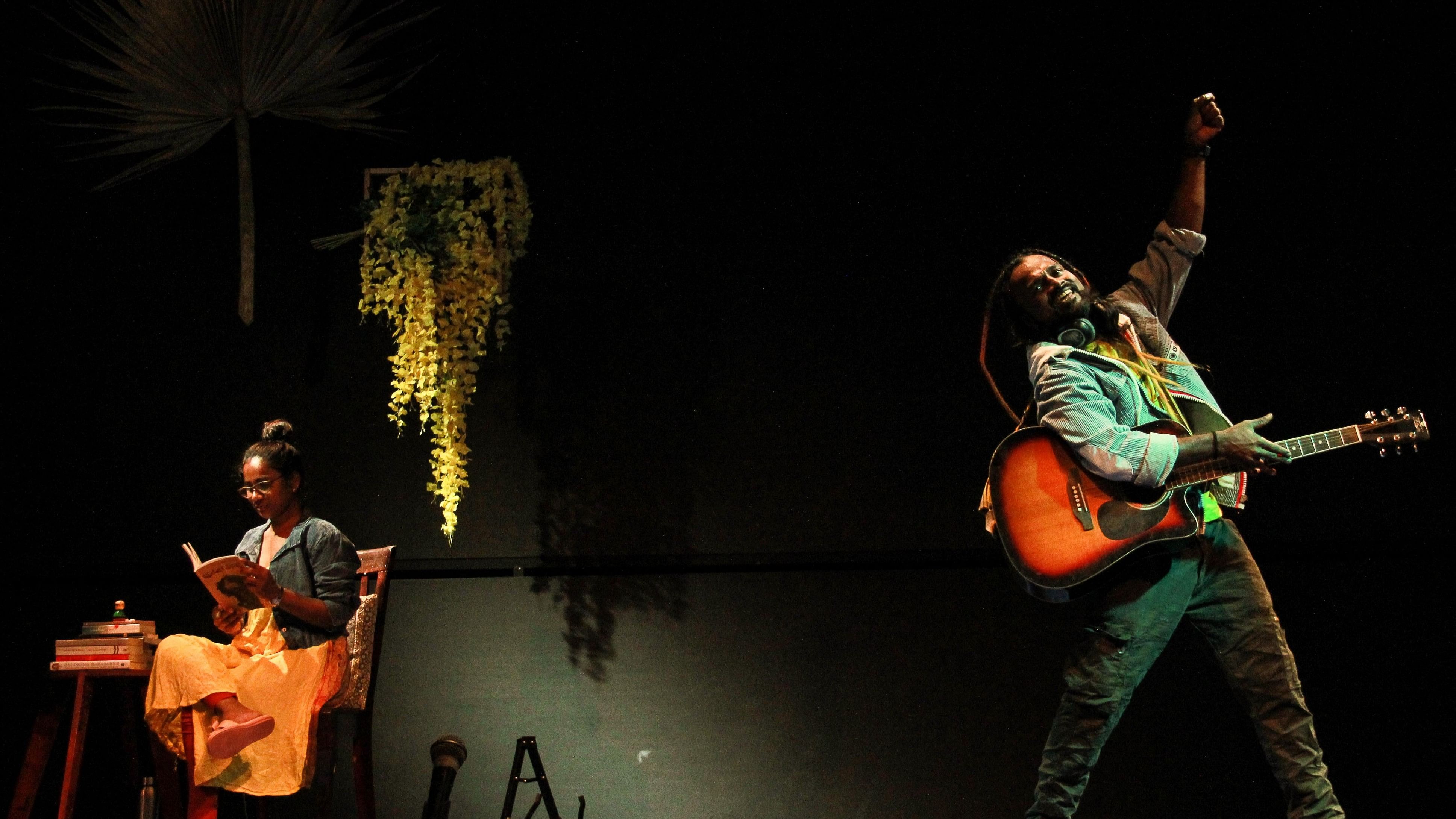
Theatre troupe Jangama Collective's latest production, 'Bob Marley from Kodihalli', premiered at Nirdigantha's six-day theatre festival, Nehada Neyge (weaving fraternity) in Mangaluru.
The production pays tribute to Jamaican Reggae musician, Bob Marley, an icon of Jamaican Rastafarianism — a socio-spiritual movement unique to Jamaica. Marley's, 'Get up stand up, stand up for your rights' is used as a prologue to the play which opens with an empty stage. The show concludes with a Marley-style Kannada number, 'Shresta kanista annodu irovergoo...'
It explores the existentialist state of 'Dalit youth' in the 21st century cosmopolitan ecosystem. It is about Dalit youth who migrated to urban areas, hoping to break free from the shackles of visible and invisible violence they faced in feudal society. Is it possible for them to acquire 'liberal secular identities' in an urban setup? Do the 'identities' believed to have 'liberal face value' actually have any? Or are they a set of masks behind which hides an entrenched hegemony of caste exclusionism? In essence, what is 'liberative choice of freedom of existence'?
Though these theories have been discussed and debated by Dalit scholars and millennial activists, the task of articulating them through art is challenging — simply because it is expected to give new dimensions and a fresh point of view. This is why Jangama Collective's theatrical presentation is refreshing.
Performing such a theme needs style that breaks the normative grammar of theatre.
Director K P Lakshman starts off with a Brechtian approach. While the audience gathers the narrative with minimal props, Marley's number continuously reverberates in the hall. We see volunteers holding hand-written posters with the text: 'House rent. (M) 944xxxxx'.
The director doesn't waste time in introducing the three characters assembling in the space of a house in an urban apartment. Audiences are made aware of the characters' assumed identities with their conflicting ways of negotiating their existence.
Episodically, the narrative flows in Brechtian comical Gestus (the style of acting Bertolt Brecht pioneered to reveal social identities of characters and their relation).
Within the first quarter, we are introduced to the ensuing tragic fate the three youth are about to face. While maintaining the tragi-comic flow, the audience is presented with interludes of textual voiceover of B R Ambedkar's haunting piece from 'Waiting for Visa', Rohith Vemula's last letter and a diegetic reading of N K Hanumanthaih's iconic poem.
As the audience is settling for a Brechtian-style of performance, the director changes gears to an experiential or immersive style of presentation to unravel the past lived experiences of the three characters. This style-shift not only unsettles us as an audience, but also pushes us to come face-to-face with the crisis of the existence of the three youth.
By this point, the audience is made aware that there is no ready resolution to the violence let loose on the characters and that there's no space for catharsis. The characters slowly come to terms with their tragic reality. Their yearning for survival is the sole weapon against the oppression in urban spaces. They gather their belongings and get ready for yet another journey — indicating another state of exile. The ensemble of performers line up on stage, singing a Kannada reggae number. Without being preachy, it draws attention to residual social exclusionism inherent in our existence.
Drawing from real-life narratives of Kannada Dalit writers, the agonising experiences of Baba Saheb and Rohith Vemula and with indirect references to Black filmmakers like Regina King, Jangama Collective weaves an immersive theatrical presentation of Dalit lives. Shwetha Rani, Chandrasekhar and Dingri Bharath bring out complex performances with ease.